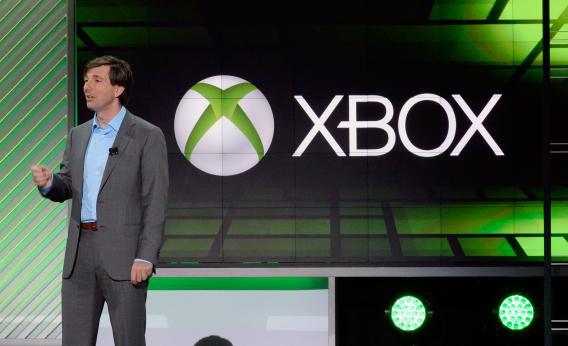Maybe it’s not game over for the Xbox One after all. In a dramatic turnabout straight out of the Ace Attorney series, Microsoft reversed course on the two policies that have inspired more nerd rage than the double cancelation of Futurama: The Xbox One will no longer have to “check in” to the Internet once a day for it to function, and Microsoft is dropping its incomprehensible restrictions on used games. In short, Xbox players can have their game and sell it, too.
On Tuesday, Don Mattrick, Microsoft’s comically pompous president of “interactive entertainment business,” put out an “Update on Xbox One” that was pretty much a big “just kidding” to everything he said at E3 earlier this month, where the Xbox One and Sony’s PlayStation 4 were both unveiled. “The sharing of games will work as it does today, you will simply share the disc,” Mattrick wrote, pretending his company hadn’t been humiliated by a viral video from Sony mocking Microsoft’s refusal to let you simply share the disk.
This statement from Mattrick, a video game villain up there with Bowser, is tantamount to the DMV writing you a letter apologizing for its long-standing disrespect of your time. Then again, consider the narrative coming out of E3: that the Xbox One was expensive, restrictive, and would transmit footage of you watching porn directly to the home office of James R. Clapper. Blindsided by Sony announcing the PlayStation 4 will be 100 bucks cheaper than the Xbox One, and won’t require friend lists, game libraries, and eye of newt to let your brother borrow your copy of Madden, Microsoft had to reverse course.
Microsoft’s about-face isn’t just “great news” for GameStop, the lead trader in used games; it’s also a victory for nerds, who ceased fire in their Nintendo-Sony-Microsoft fanboy wars just long enough to unite against anti-consumer practices—not through whining on message boards (though there was a bit of that, too), not through game piracy, but through a good old-fashioned boycott threat, aided and abetted by a gleeful Sony.
Some questions remain unanswered. Will Microsoft continue to pretend that it’s too hard to make download-only Xbox 360 games like Braid work on its new console, then turn around and try to sell me an Xbox One version of the game? And what happens when disks finally, inevitably become obsolete, as games, like music, move to the cloud? Mattrick says, “Downloaded titles cannot be shared or resold.” What, then, are you buying when you buy a downloaded game? A traditional view holds that you don’t really own something if you can’t sell it, but, so far at least, Apple doesn’t let us sell “our” MP3’s.
Still, whatever happens next, the Nintendo fan frolicking in the Mushroom Kingdom, the Sony loyalist creating a level in LittleBigPlanet, and the Microsoft gamer yelling commands into his headset should remember this moment, when their collective power scared the big boys into admitting their feedback matters.
